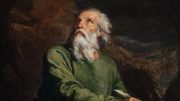We are called to love the Lord our God with all our hearts, souls, and minds (Matthew 22:37). This writer and my wife contribute to a missionary couple in France, a couple that has been there for decades. Sadly, over the centuries, French culture has divested itself of its connection to Christ and has chosen instead to put philosophy rather than faith as the cornerstone of its cultural life. The French are too likely to put their minds on the words of philosophers than on the Word of God and the person of Christ for direction in their lives.
Philosophers emphasize logic, which includes non-contradictory expressions and thoughts, but extends beyond that into the development of process, both in everyday life and science, as we travel from point to point in developing our plans, design projects in all fields of endeavor, and organize ourselves to create and reach various goals.
It would be irrational to look at a pile of shirts and say, “Some shirts are blue, some shirts are red; therefore all shirts are green.” The conclusion does not follow logically from the premises. Similarly, it would be illogical to say, “Mankind is fallen and cast down and imperiled with original sin and thus eternal death in hell, Jesus Christ is the only path to forgiveness of that original sin; therefore, our studies should focus on the writings of the atheist philosopher Jean- Paul Sartre.” We can see the fallacy of the above thoughts because logic, which we have learned from philosophy, has taught us the right ordering of our minds. But we only know that Christ is the only path to forgiveness because of the revelation of God through His Word (Sola Scriptura), and through the birth, life, death, and resurrection of Jesus Christ Himself — God’s revelation of Himself made flesh (Sola Christus).
Another term explored by philosophers is consciousness. Consciousness is the relationship that obtains between our minds and our experiences as well as our mind’s relationship so to speak with itself. Philosophers like the atheist Jean-Paul Sartre focus on becoming — movement through decisions as we travel in our lives through time and space — as the path of consciousness. Becoming is directed by consciousness, but, at the same time, pulls consciousness into the complexities of the future. The objects or concerns of this complex future are ethical, but also have to do with our learning or knowing in life and can be metaphysical.
Ultimate questions as to the purpose of life, the origin of existence, and our values are arbitrated by a consciousness in flux. For Sartre, freedom defines this process, and is ultimate (though it can only be understood in terms of becoming which is relative). It does not exist independently before consciousness nor does one evolve into freedom over time by “becoming.” Rather, freedom is an existential reality that inheres in consciousness and the experience of becoming but is not an effect of consciousness or becoming.
Yet, John 3:7 is where Jesus Christ Himself tells Nicodemus (and every reader), “You must be born again.” And being born again is being born both of the water and the Spirit. There is no consciousness in being born. Birth is the launching of the infant into independent selfhood. Similarly, even assuming that Sartre actually describes the state of social man, consciousness, becoming, and freedom, those descriptors of life are, at the moment of spiritual rebirth, launched into a new dimension, a new context if you will, of spiritual independence and relationship with our Creator. We suddenly belong to Him, and no longer to natural or philosophical process. A new identity kicks in. That new identity in Christ is salvation.
Salvation cannot be created or even induced by philosophical reflection. It cannot be discovered by exploration or research. No amount of personal longing and determination can bring it about. Rather, it is a free gift of God given to whomsoever it pleases Him to give it by His grace (Sola Gratia) and we appropriate that gift by faith (Sola Fides) not by choice per se, but by humble submission to the one who was born of a virgin on Christmas day, the one who died on that ole’ rugged Cross approximately 33 years later, and who, three days after His horrible execution, rose from the dead, soon to ascend to Heaven where He stands forever (Revelation 5:6) with the Father seated on the throne.
Lastly, we need to look briefly at philosophy’s perennial attempt to define the purpose of life.
For philosophers through the ages, different answers have been given to this question. Plato said that the ultimate purpose of life was to understand the Forms (eidos) of existence. These Forms were glimpsed by souls during the reincarnation process as transmigrating souls were looking for existing entities in which to enter. Philosophers were those whose reasoning was most established, and it was they who had the best recollection of the Forms — which included not only the Forms of things like horses or trees (thus enabling humans to know what a tree or horse essentially is) — which enables philosophers to know what goodness, truth, or beauty is. Their reason is able to recollect the Form of these philosophical abstractions that most men can, at best, only speculate about but never really know.
Plato’s amazing student Aristotle believed his teacher had it all wrong. The essences of truth, beauty, goodness, justice, courage, etc. were understood by our minds which had the ability to think abstractly. We did not recollect Forms in order to understand the highest goods of life. Instead, abstract thinking was able to separate the essences of substances and ideas and from more tangible primary and secondary properties of things as well as extreme behaviors operating in the lives of people. We are to apply our reason to avoid extremes of excess and deficiency, and thereby arrive at the Golden Mean which is a balanced, reasoned understanding combined with actions based on that understanding. The final goal of life is Happiness, and happiness is based upon contemplation of these habits of right (Golden Mean) actions overt time.
Thomas Aquinas one of the great medieval philosophers affiliated with the Roman Catholic Church appropriated Aristotle’s thought, but added that since death would bring to an end the achievements of living a reasoned, balanced life according to the Golden Mean that sorrow of death would ultimately undermine our contemplation of the Golden Mean in our lives as Aristotle stated. Thus, faith in our Savior was ultimately the purpose of life. Aristotle was right but he needed Christ to complete his figure of the basis for happiness.
Yet, for the Protestant reformers, Thomas Aquinas and his philosophical colleagues had overly rationalized the source of true happiness. The source of true happiness was Christ alone (Sola Christus). The Good and forever-happiness does not begin with man’s reason guided by Christ, and then end with faith in Christ. Rather, goodness and happiness begins and ends with Christ without specified intermediary or in-between steps. Though philosophy may be attractive to some, philosophical engagement combined with Christ is not essential for happiness in this life or the next. Rather, as the Westminster Shorter Catechism answers the question “What is the purpose of life?” it says, “The purpose of life is to glorify God and enjoy Him forever.”
Philosophy cannot be the endgame of life as French culture seems to believe. Sartre’s colleague and friend, Albert Camus, even said that the most important question in life is “should I commit suicide.” This is where philosophy leads. Philosophy does not lead to Christ. Nor is philosophy able to advance the cause of Christ. The French must accept this, and so must Americans who are looking for hope, joy, and love in all the wrong places.
Personal afterword: As someone gifted in philosophy since childhood, who was privileged to study philosophy for seven years at Harvard University, I want to offer a testimony of thanksgiving to Jesus Christ for graciously granting me the understanding to see that the masterworks of philosophy are not, even in part, saving. Christ alone is our individual hope and He alone is the way, the truth, and the life. (John 14: 6)
Jeffrey Ludwig
To read more articles by Jeffrey Ludwig click here.





